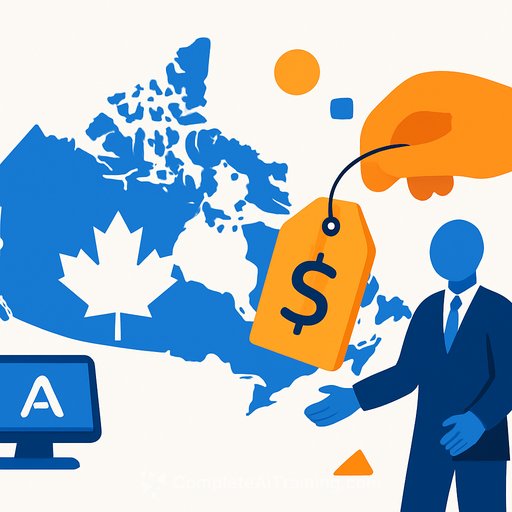OpenAI's Canada Pitch: Digital Sovereignty or Strategic Dependence?
OpenAI is courting Canada with a promise: build AI data centres on Canadian soil and support "democratic AI." For a government seeking digital sovereignty and reduced dependence on U.S. tech, the offer is compelling - and risky.
The company is building a global network of facilities under its multibillion-dollar "Stargate" initiative. Canada's low-cost energy, stable grid, and talent base make it an attractive candidate. Chan Park, who leads U.S. and Canada policy at OpenAI, says Canada has the "power, resources, and desire" to lead.
What's at stake for Canada
Digital sovereignty means the ability to control data, infrastructure, and the rules that govern them. For Ottawa, that translates into where models are trained, where data is stored, who holds the keys, and which laws apply when foreign firms are involved.
Here is the core tension: partnering with a U.S. company could speed up deployment and investment - but it could also keep the ultimate control outside Canadian jurisdiction.
Legal constraints you cannot ignore
- U.S. CLOUD Act: U.S. authorities can compel access to data held by U.S. companies, even if the data sits on Canadian soil. See the U.S. DOJ overview: CLOUD Act.
- CUSMA/USMCA Digital Trade: Limits on restricting cross-border data flows can narrow Canada's policy room. Reference text: USMCA.
Bottom line: even with data centres in Canada, jurisdictional conflicts persist if ownership and control sit with a U.S. entity.
Resource reality: power and water
AI facilities are energy and water intensive. Experts estimate the load equivalent to powering roughly 8-10 million Canadian homes. Some sites consume up to a billion gallons of water annually for cooling.
Any data centre program will need firm capacity planning, grid upgrades, environmental approvals, and community buy-in - before shovels hit the ground.
The OpenAI proposition vs. Canadian objectives
OpenAI has active U.S. government contracts, including supplying ChatGPT to the U.S. federal workforce and a recent defence contract. That deepens the jurisdictional question: whose rules win in a conflict?
Park says the company will align with Canadian values and privacy standards. The question for policymakers is how to turn that promise into verifiable, enforceable terms.
Policy options for a sovereign-by-design approach
If Canada proceeds, require these guardrails
- Canadian legal control: Data and models used for Canadian public sector workloads must be held by a Canadian-incorporated entity not subject to extraterritorial control, with board and operational independence.
- Key custody in Canada: End-to-end encryption with customer-held keys operated by a Canadian public body or a Canadian-controlled trust. No U.S.-accessible key material.
- Data localization and segregation: All Canadian public sector data, model checkpoints, logs, telemetry, and backups stored in Canada, segregated from foreign workloads.
- Lawful access constraints: Contractual clauses requiring the provider to challenge extraterritorial orders; mandatory disclosure to the Government of Canada of any foreign legal process.
- Independent audits: Annual third-party audits of access controls, encryption, data flows, and residency guarantees. Audit rights for the Treasury Board Secretariat and the Office of the Privacy Commissioner.
- Transparency: Public reporting on data access requests, incidents, model updates affecting government workloads, and energy/water use.
- Security posture: Confidential computing, strict admin access controls, immutable logs, differential privacy where applicable, and red-teaming for model misuse.
- Exit and portability: Data and model portability with tested runbooks; penalties if SLAs or sovereignty terms are breached; escrow for critical IP needed to maintain continuity.
- Environmental conditions: Caps and reporting on energy and water intensity, requirements for clean power procurement, heat reuse plans, and community impact agreements.
- Economic benefits: Canadian R&D commitments, workforce development targets, and procurement opportunities for domestic firms.
- Indigenous engagement: Early, sustained consultation and consent processes for land, resource, and infrastructure decisions.
Alternatively, build a mixed model
- Domestic core + allied partners: Use Canadian providers for sensitive workloads; use allied foreign providers for low-risk workloads under tight controls.
- Federated architecture: Keep data and key services in a Canadian trust zone; let models come to the data via secure enclaves, not the other way around.
- Public sector reference stack: Publish a government-wide blueprint for sovereign AI hosting, identity, logging, incident response, and assurance.
Procurement playbook for departments
- Mandate residency and control: Data, keys, and admin operations in Canada, with proof via independent attestation.
- Tie payments to compliance: Milestone payments contingent on audit outcomes and uptime, security, and sovereignty KPIs.
- Classify workloads: Define "Canadian-only," "allied," and "public" tiers to match risk to hosting rules.
- Include incident drills: Tabletop exercises for cross-border data requests, breaches, and facility outages.
- Benchmark domestic options: Always run a Canadian-owned alternative through evaluation, even if scale is smaller.
What to do in the next 90 days
- Publish a Government of Canada position on AI data residency, key management, and foreign legal process.
- Launch a model RFP with the guardrails above to test market response from OpenAI and Canadian firms.
- Stand up an interdepartmental review unit to assess sovereignty claims and audit evidence.
- Begin grid, water, and siting assessments with provinces and municipalities for any proposed facilities.
- Advance the bilateral CLOUD Act agreement talks, with red lines protecting Canadian public sector data.
The pragmatic path
Shutting out global players would slow capability growth. Blind acceptance would compromise autonomy. The path forward is conditional engagement with enforceable protections, paired with real investment in Canadian providers.
Do the deal only if Canada controls the keys, the logs, the data flows, and the exit. Anything less is dependence dressed up as sovereignty.
Upskilling for government teams
To execute on these standards, public servants need shared literacy in AI procurement, model risk, and data controls. A focused curriculum can speed that up.
- AI training paths by job function for policy, procurement, security, and operations.
Your membership also unlocks:






